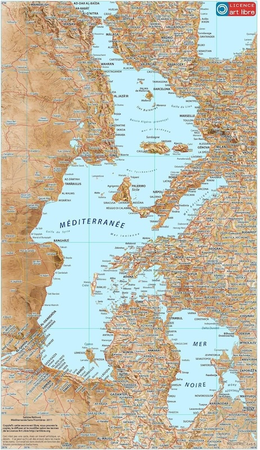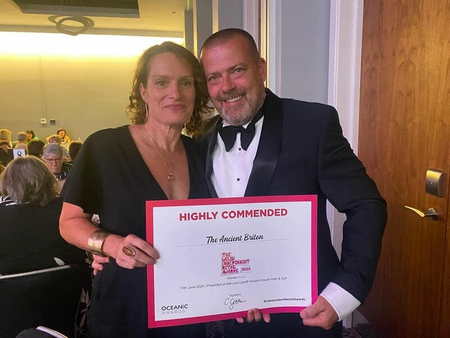
Wiki
Obit
Anthology
Peaceful? In 1500 CE there were by various estimates I've seen over the past 80 years some 3,000,000 to 10,000,000 non-European and presumably non-Christian inhabitants of North America (north of Mexico). About 300 distinct languages were spoken, distributed among major language groups such as Eskimo-Aleut, Algonquian, Athabascan, and Siouan, as well as many smaller groups. California alone had more than 20 distinct language groups, reflecting especially high linguistic diversity.
Today after 425 years of "peace" there are about 400,000 (based on language as an indication of culture). That number rises to as many as one million if one adds persons who identify with a tribal nation but do not speak its language.
If there were ever a clearer example of decimation I've not seen it.
"Serendipity" is the "faculty of making happy and unexpected discoveries," according to its 1754 creator. (Source) It's also a good description of what happens when one surfs the WWW. This offering is about today's serendipitous experience, which calls forth a possible solution to all our problems. It’s election year, so please be generous should I digress.
Part One: Coincidence
Yesterday I had a conversation with Charles, who happens to be from Cameroon. The subject arose of a website I created with colleagues in the 1990s (aabl.com) with an African news theme. That site is not well developed, but it remains in the realm of possibilities.
This morning I realized I had forgotten much of what I once learned about Cameroon, so I looked it up in the CIA Factbook. I was reminded that when I was a child there were two European colonies there, an English one called Cameroon and a French one called Cameroun. (Yes, it means prawn or shrimp, after a local river estuary. It has nothing whatsoever to do with certain Camerons of Scotland, to whom I may be distantly related.) The two were merged into the modern state in the 1960s.
End of Part One, and we're through with Cameroon for now.
Part Two: Random Walking

Today on Facebook, someone posted a map of the Mediterranean Sea, annotated in French and unusually rotated with west at the top. It’s a physiographic view overlaid with the names of hundreds of cities of all sizes.
My eye went to the one part of the Med on which I’ve traveled, from Brindisi in the south of Italy, to Kérkera (Corfu) in the west of Greece. And thence the train of memory pulled out of the station.
It was 1980, and I had some time to myself while "between situations" and decided to go to Europe. I bought a Eurailpass, and after a few days of rolling along through Luxembourg, Switzerland, northern Italy and Rome, I arrived by train at Brindisi, a small port on the Adriatic.
The trip from Rome to Brindisi was overnight in a "couchette," a little room in the train with seating for six that could be made into a sleeping space by magically folding the seats and unfolding cots from the two walls, creating six resting places, three on either side, arranged in bunk bed fashion.
With me in the room were
• a former employee of the UN — in Geneva, if I remember correctly — who was traveling with his small daughter to the south of Italy to undertake a new life as a beekeeper; he had been working in an office during the era of the Bader-Meinhoff and Brigade Rosse terror bombings by mail and had decided to give up that work to devote himself to his child; he regaled us for hours on the virtues of honey
• the lovely Gretel M and her traveling companion Tina B, who were touring Europe in the same way as I, looking at the names of towns and cities in a train station and picking a destination on the spur of the moment
•I cannot recall whether or not there was a sixth person, who would have needed to be rather special to compete in memory with the others
We arrived in Brindisi in the morning. The young ladies and I said good-bye to the beekeeper and his daughter, and walked about while we awaited the ferry to Greece. A story for another time.
Time warp! Now it’s a week earlier, and I’m boarding a train from Verona to Venice. It turns out that a first-class Eurailpass ticket does one no good if the first class cars are full, but one can swallow one’s pride and take a second class seat.
Second class on that particular line was open seating in little sets of bench seats facing each other with four places each. I arrived in time to choose my seat on the right facing forward with a large window through which to observe the countryside.
Quickly the car began to fill, and I heard "Sono occupati cuesti…?" — are these seats taken — and I was joined by three young Italian men, with smiles and accommodating gestures all around.
One of the most interesting parts of traveling by train in Europe is "the language negotiation" that occurs at the beginning of a trip, assuming people are in a talkative mood. It quickly becomes apparent which language the most have in common, and that becomes the language of the trip. We four began to introduce ourselves in their Sicilian, my halting Italian, the high school French of one, and my relatively fluent Spanish. The Spanish connection arises, because the dialect of Sicily is very similar to Spanish, to the extent that with a bit of patience they are mutually intelligible. And the train pulled out.
My new friends were Gianni, Roberto and Salvatore, who I learned were construction workers from Sicily, working on a building project in Verona for the summer. We were all on our way to Venice to be tourists. Gianni and Roberto were both worn out from their week’s work, but Salvatore and I began a conversation that lasted most of the trip, whereupon they went their way and I mine. I think he got a kick from the American college professor riding in second class who enjoyed chatting and finding common ground with whomever happened along, probably not an everyday occurrence.
Two days later, as I was walking toward the station to board my train southward, I heard "é, americano!" and turned to see my new amici. We chatted for a moment and said our good-byes. Salvatore handed me a scrap of paper with his address in Sicily. Later in the trip I sent him a postcard, but that was the end of that. The scrap of paper remained — or remains — in the top middle drawer of an old desk at my son’s house; I need to check on that.
Here’s the fun part. Salvatore was clearly engaged with the world, a political person, and our discussions had ranged over many topics of the time, the Vietnam war ("what were you guys thinking?"), terrorism, international affairs, a primer he gave me on Italian politics, etc. Salvatore turned out to be an intellectual, cleverly masquerading as a construction worker.
So today, the map on the Facebook page triggered the memory, so I did a search on his name. It turns out that "salvatore di falco, sicily, sicilia" returns results about several individuals sharing the name, who knew?
One of the results was a page in a Sicilan newspaper, describing the torching of a couple of garbage dumpsters, apparently the result of arson by a political faction aligned with the less savory part of local life in an attempt to intimidate voters. Whose opinion was that? You guessed it: Salvatore di Falco. Whether "my" Salvatore I do not know, but my new flag bears curiosity rampant on a field of green, white and red. It seems entirely in keeping with the young man on the train that he might have become a political leader.
To the original point, each of the players in this little story, if they remember it at all, remembers it differently. If they should ever write down their version and post it on line, some future historian, perhaps an artificial one, may synthesize it into a more complete recitation of the events. Or not. Either way, all hail the WWW!
E se per caso tu fossi il mio Salvatore, per favore scrivimi due righe. É passato troppo tempo.

From our Anything but Science File:
The young volcanic island of Surtsey formed off the coast of Iceland starting in 1963. Life magazine was all over the story then, but the media lost interest, though Surtsey continued growing. Rapid growth has ceased, and of course life, gravity and erosion have found a way.
Creationists have seized on the emergence of features resembling those used as markers for geologists, claiming that because analogous features have formed quickly on Surtsey, the Earth "could be" much younger than accepted geological models show. Of course, it was only a hop, skip and jump and hosanna" to "IS much younger."
It's even more remarkable than that!

Sue Schultz wrote:
When I was a child, my mother said we were descended from the Prince of Wales. I told the nuns at my school who laughed. 55 years later, doing research + DNA, I did find there was some chance our Griffiths from Ystradgynlais might have descended from a prince of south Wales. At the cathedral in St David's, I did find the sarcophagus of Rhys ap Gryffudd died ca 1187 & said this is good enough for me.
(I spotted the name of Ystradgynlais, a village in Breconshire, Wales. -RC)
Rees Clark wrote:
Sue Schultz — I was in Ystradgynlais a few weeks ago. My Welsh-speaking great-grandmother and earlier generations were born there, and BTW lots of Griffiths and Gruffydds are buried near her in SE Idaho in a little village cemetery with many Welsh names.
Enjoyed seeing Y's lovely main street, much upgraded since my previous visit 40 years ago, and I recommend the Ancient Britain at edge of town for lunch; try the hake.
Dean Rees, Author, who had started the thread, wrote:
Rees Clark — (an image appeared here) along with a note that Dean's friend owned the local "Ancient Briton" restaurant I mentioned in the earlier reply and that the restaurant had won a culinary award.
Rees Clark wrote:
"Briton" — I stand corrected; the recommendation stands. ????
Rees Clark wrote:
Dean Rees — Absolutely fantastic; congratulate him.
My Welsh cousin drove me around Glamorgan for a couple of days, and we discovered the AB quite by accident. We were astonished and well pleased at the ambience, quality and presentation.
I was lucky in my genealogical quest; my great-grandparents joined the LDS church around 1850, married and took their mining and farming skills to the Appalachians and later to the Rocky Mountains along with thousands of other Welsh folk. As a religious obligation they kept track of their ancestors, and though my grandfather left the church those records came to me from a cousin.
The migration transformed that family; my great-grandmother never learned to read or write, yet her descendants have been farmers and ranchers but also lawyers, soldiers, politicians, professors, world-famous entertainers and successful business executives. Probably all a consequence of attending a revival meeting in Ystradgynlais around 1850. Butterly wings were indeed flapping somewhere!
— Revised 2024 — RC
À bas la guerre!

